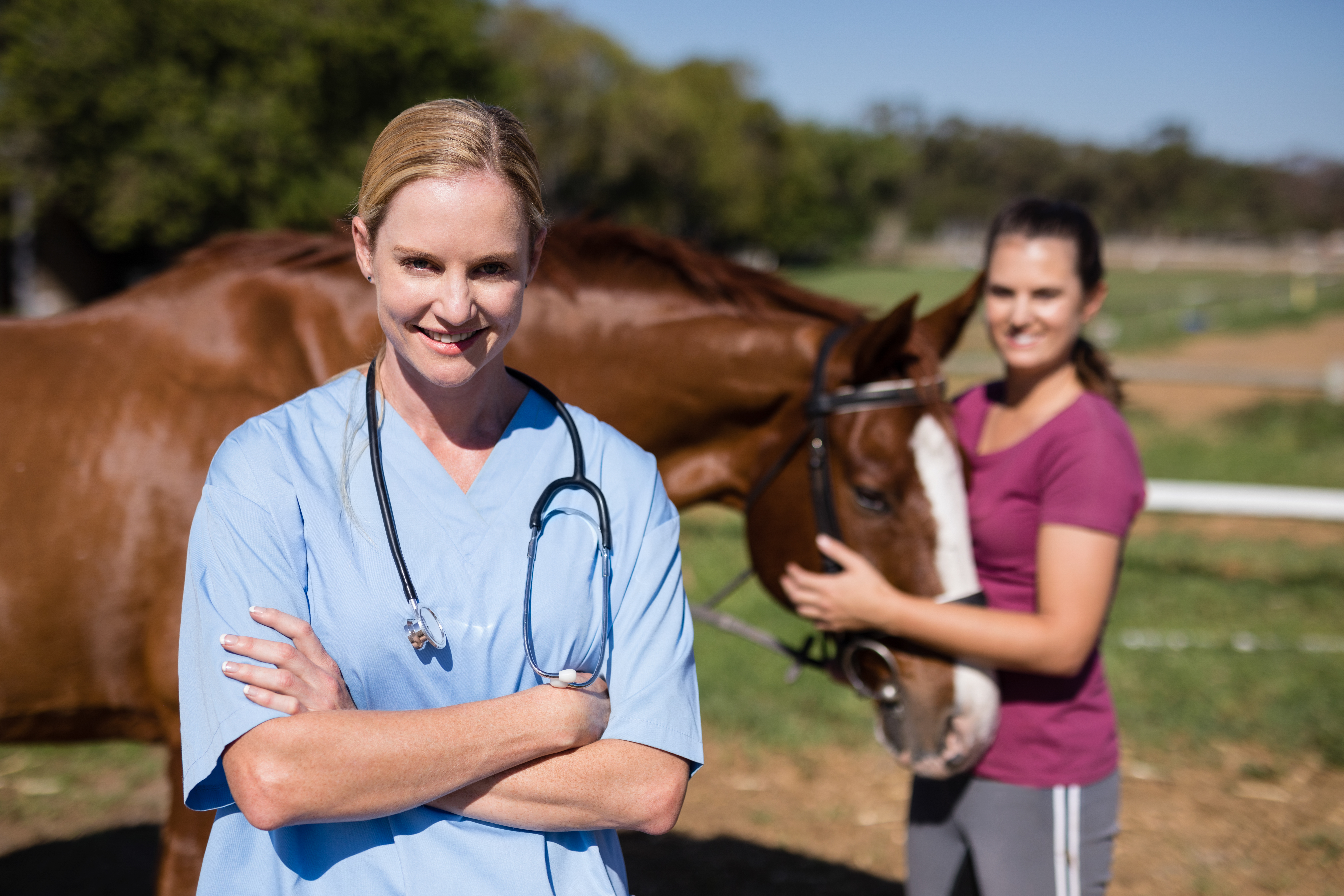There is an evolution taking place in the equine industry. The “gold standard of care” for horses has taken on a whole new meaning with advanced veterinary diagnostics, treatments and preventatives. And the relationship between the horse, the client and the veterinarian is also changing.
Equine veterinarians today said that they want to feel like not just a part of your team, but a part of the success of your horse. They want to share in your victories just like they share in your worries and sorrows.
Equine veterinarians are very appreciative of the small things that clients do to express their gratitude for their hard work. Dr. Holly Schmitt of Foxwood Equine Sports Medicine in Lexington, Kentucky, said, “I love hearing that the horses that I work on are doing well in competition. A shout-out on social media always makes my day. We are really invested in how well the horses do, and the little things like an expression of appreciation or simple thanks mean a great deal to us.”
.jpg)
According to Dr. Katherine Fertig of Orange County Equine Veterinary Services in Mission Viejo, California, “I love getting thank you notes, emails or pictures of how great a patient did at a horse show, event, trail ride, etc. I also love getting updates on how well a horse responds to a treatment.”
When asked “What is your greatest joy/satisfaction in practice?” equine practitioners have no hesitation. “My favorite part of veterinary medicine is learning from others and helping to educate them in my area of expertise,” said Dr. Kyle Clark of Mid Atlantic Equine Medical Center. “None of us have all the answers, so it truly takes a village, and I’m happy to be a part of the horse’s health care team. We understand the panic that clients experience during an emergency, and we truly appreciate that they trust us to be their first call during those times.”
Dr. Derek Cavatorta of Black Brook Veterinary Services in South Hamilton, Massachusetts, related that, “I really love the science of medicine and the challenge of a difficult case. I find treating and curing a sick horse to be extremely rewarding. I also really enjoy forming close personal relationships with my clients, their families and their horses.”
Dr. Margaux Buchanan of Sarasota Equine Associated in Sarasota, Florida, said, “Knowing I made a difference in my patient’s lives—the gratitude of the owner and seeing a horse happy and healthy or healing from what the healthcare team did—is always my biggest take-home. When days are hard, I go through the thank-you notes from previous clients—those heartfelt notes of gratitude that show I helped and mattered in someone’s moment of need/darkest hour keep me buoyed on the hard days.”
The Equine Veterinarian’s Life
Why do equine veterinarians say that these inclusions and kind words from their clients are so important? They choose a career in equine veterinary practice because they love horses, but the life of an equine veterinarian is hard—physically, emotionally and financially.
Over the last 50 years, equine veterinarians have trained clients to expect same-day service, unlimited access to them for concerns and fees that are a fraction of those in companion animal medicine on a pound-for-pound basis.
Some of the issues that equine veterinarians face are low salaries compared to small animal veterinarians; the lack of regional equine emergency clinics, which means long work days with less time for family, friends or even themselves; the rising cost of veterinary school (the average vet school debt at graduation is about $183,000); and the rising cost of purchasing advanced diagnostic equipment that clients demand. This all translates to stress, compassion fatigue and burnout prior to leaving the profession.
A shocking statistic is that about 50% of veterinarians who enter equine practice each year end up leaving. Equine veterinarians who leave most often take jobs in small animal hospitals. These positions typically offer a three-to-four day work week, no emergency duty and often no weekend work, all for a salary twice that of a new equine doctor.
While those who stop treating horses are often heartbroken at the loss of a dream, they value having time for a personal life that might include children, riding a horse of their own and/or pursuing other interests. The additional compensation also allows them to experience less stress about paying educational loans.
Added to that is the fact that only 1% of vet school graduates each year enter equine practice, which translates to only about 40 new equine doctors a year. Research shows that about 60 equine veterinarians retire each year, and that number is expected to grow by about 3% as we go forward.
Currently, graduating veterinarians want jobs that have a higher compensation with less hours and more flexibility. That means the life of a horse doctor must change or the future could see a lack of equine veterinarians.
As the demand for services exceeds the supply of available equine veterinarians, expect veterinary costs to rise. Emergency service on the farm 24/7/365 will probably be restricted to only those animals that cannot stand or travel. Clients will probably have to transport most horses to emergency centers or local hospitals in order to get care.
How Horse Owners Can Help
OK, some of that new reality is scary. So how can horse owners help their veterinarians feel less pressure in doing the job that they love so these dedicated professionals want to stay in equine practice?
Dr. Julie Settlage, Equine Professional Services Veterinarian at Boehringer Ingelheim Animal Health USA, said, “One of the biggest areas where horse owners can help out is allowing your veterinarian to not be a veterinarian when they are not working. If you use a multi-doctor practice, be willing to allow one of the other veterinarians to see your horse if your regular veterinarian is off-duty that day.
“Also, if possible, try to be flexible,” said Dr. Settlage. “The more flexible you can be when scheduling appointments, the more efficient this allows your veterinarian to be by trying to schedule others in your area on the same day.
“If we can help veterinarians decrease their windshield time, they can have more time to either see more appointments or spend on their hobbies or with their families,” said Dr. Settlage. “Having time to nurture those hobbies and families allows doctors to be their best selves when working.”
Other ways that clients can help their veterinarians be more efficient, enjoy their work more and feel more appreciated, according to Dr. Fertig, is to “be kind, understanding, reasonable and pay your bills.

“I do my best provide the best, most up-to-date care for your horse,” she continued. “I do my best to be on time, and when I am running late, it is likely because of an emergency or a previous appointment taking longer than expected. Remember that I have probably been late to another appointment because I was taking care of your horse at some point (or will be in the future).”
Dr. Schmitt said that clients can help reduce her stress by being patient, accepting the changing paradigms of the profession and realizing that a team approach is beneficial for all.
In many practices, the boundaries between equine veterinarians and their clients are porous. There is often an expectation of continuous access.
“You don’t get to call your physician or dentist on their cell phone outside of office hours, but that is the expectation of many horse owners with their veterinarians,” said Dr. Nadine Salomon of Allegheny Equine Associates in Murrysville, Pennsylvania. “It is exhausting.”
The understanding of clients can help reduce the stresses that veterinarians face. Dr. Clark asked that clients “realize that we are human beings. We want to have lives outside of our jobs. We aren’t perfect. And our ‘emotional well’ gets drained like everybody’s does. Pay your bills, be cognizant of our time and be respectful. It’s so much fun working for nice people that respect my time and don’t make me track them down for payment of work I’ve already done.”
And it’s not just the horse owners who need to change, but the current equine veterinary practice owners who hire these young, enthusiastic vet school graduates who want to treat horses.
Dr. Settlage is worried that the majority of the equine veterinary profession won’t listen to and don’t understand what the younger generations in the workforce need in order to have full careers as equine veterinarians. She believes that “if there is an open and honest and routine dialogue between practice owners and their associates (new veterinary hires) about satisfaction, burnout, practice needs, etc., then there is opportunity to adjust to each personal situation over time.”
Take-Home Message
Horse doctors love horses and horse people. But if there isn’t a change in the veterinary profession, there will continue to be a loss of quality equine veterinarians. This means respecting your veterinarian as a person, respecting their time away from practice, and respecting their need to get paid.
According to Dr. Holly Schmitt of Foxwood Equine Sports Medicine in Lexington, Kentucky, “Trying to create work–life balance is the biggest stressor in equine practice. It is hard to be fully available to my clients and still be able to feel like I’m giving to my family.”
As Dr. Bret Luedke of Heritage Equine Clinic in Berthoud, Colorado, related, “Our biggest issue with clients is the after-hours or weekend messages asking non-emergent questions.”
Dr. Nadine Salomon of Allegheny Equine Associates in Murrysville, Pennsylvania, said that the steady flow of urgent appointments and add-ons leads to stress. “Where can you fit in this client?” is the constant question asked by her staff. Her husband and children would like her to be home to see them at the end of the day, but “it is so hard to say ‘no’, especially to clients you know and love.”
This article originally appeared in the Fall 2021 issue of Practical Horseman.
This article is brought to you by












